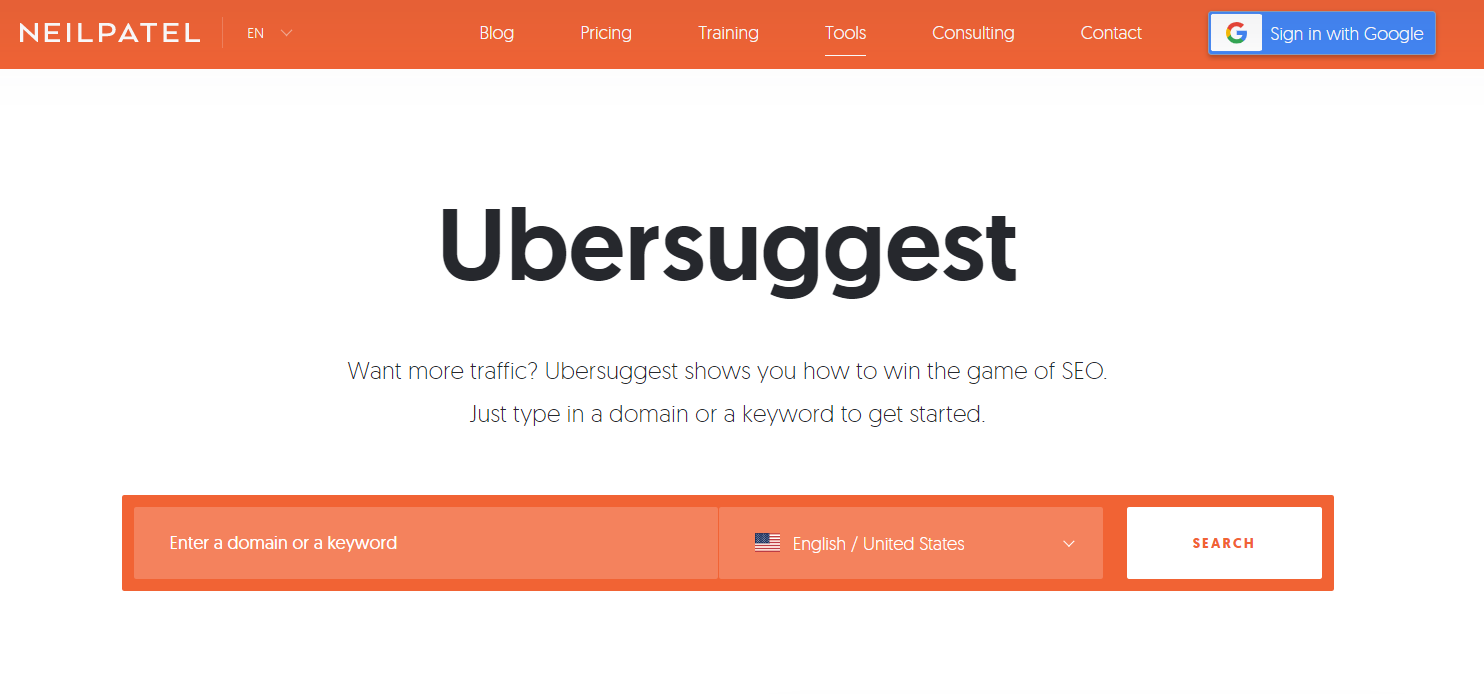Marketing is hard. And it’s easy for people starting out in digital marketing to feel overwhelmed by all the moving parts. From ad platforms to social media algorithms, there’s a lot for newbie marketers to wrap their heads around.
Fortunately, however, there’s a quick-fix available. Online tools, many of which are inexpensive and completely beginner-friendly, can help you streamline your workflows and complete time-intensive tasks quickly.
In this post, we’re going to provide a comprehensive toolset for beginning digital marketers. It will cover all the key areas, including search engine optimization (SEO), email marketing, social media, content management, analytics, and more.
Once you’ve finished reading, you’ll be well-equipped to launch organized, creative marketing campaigns that drive a clear return-on-investment.
1. Ubersuggest
Ubersuggest is an all-in-one search-engine-optimization tool. It provides a large set of features for monitoring and growing your presence on Google. Few other solutions offer the same level of functionality and comprehensiveness at such a competitive price.
Notably, as a new user you can take advantage of a “forever free” plan, which allows you to track up to twenty keywords and analyze one-hundred-and-fifty site pages. This is a great option for those who are new to SEO and eager to get a sense of how an organized campaign runs.
Top Features: Rank tracking, competitor research (you can “spy” on other sites), keyword suggestions.
2. MailChimp
As you dive deeper into the world of online marketing, you’ll quickly learn the importance of building an email list. While you might have multiple top-ten rankings in the search engines or large social media followings, you don’t actually own any of these assets. A mailing list, on the other hand? That’s yours.
MailChimp will provide you with everything you need to collect subscribers, nurture them with automated email sequences, and craft effective sales funnels when you’re ready to pitch a product or service. You’ll have access to an array of time-saving automation, design, and research tools for getting the most out of your list.
Top Features: Segmentation, beautiful email templates, A/B testing, and analytics.
3. WordPress
WordPress might seem a little out of place in a post about digital marketing tools. Isn’t it a content management system, after all?
While WordPress is used primarily for building websites, it’s also an incredibly useful tool from a marketing standpoint. Because WordPress is designed to work with “plugins”, which are essentially little packages that slot into your existing site, it’s very easy to add new marketing functionality, even if you don’t have any technical experience. What’s more, many plugins are free.
Want to include social share buttons on your posts? Install a plugin. Unsure about how to add an email opt-in form to your home page? There’s a plugin for that. Want to build a dedicated landing page for your new product? You probably get the idea.
Top Features: Large plugins library, easy-to-use interface, free (although you will have to pay for your site’s hosting).
4. Hootsuite
You likely already understand the marketing power of social media platforms like Facebook, Instagram, Twitter, and so on. But managing multiple social media handles can quickly become a chore. It’s not unusual for companies to have dozens of separate accounts. And taking care of everyday tasks, like content creation, replying to comments, resharing, engaging in conversations with influencers, and more can take hours out of your typical day.
Hootsuite solves this problem by providing you with a central dashboard for managing all of your social media accounts. You can schedule posts in advance, share content from the people you follow, manage conversations, and more.
Hootsuite also offers an excellent free plan, with a limit of three social media accounts, thirty scheduled messages per day, and one user. While this feature-set will likely be too limited in the long-term, you can use it to get up and running and sample the software. If you do want to add more profiles at a later date, or even take care accounts for clients, all of the plans are very well-priced.
Top Features: Post scheduling, private message management, easy-to-use interface.
5. AdEspresso
AdEspresso is like HootSuite, but for paid ads. Running paid campaigns across multiple networks takes a lot of work. AdEspresso integrates with three of the top ad platforms: Google Adwords, Facebook, and Instagram. And users can create, manage, and analyze their campaigns from one central platform, without the need to log into separate user accounts.
Some of the best features include automated rules for promoting your top-performing posts, in-depth PDF reports that are excellent for providing clients with updates, and daily actionable tips for improving the performance of your campaigns. AdEspresso also offers extensive documentation and training materials, which can aid significantly in navigating this often-complex area.
Top Features: Campaign creation, ad management, and in-depth analytics. [gr]
6. Hemingway App
As a marketer, it’s essential to create clear, engaging content. The Hemingway App is a free tool that you can use to make your writing punchier and easier to read. Use it to check content for your social media posts, ads, landing page copy, and so on. It will only take minutes but can have a dramatic effect.
Top Features: Free content editor.
Conclusion
As a marketer, your job is already difficult enough. Don’t complicate things even further by wasting time on tasks you can “outsource” to tools like the ones described on this list. Once you see the results that simple apps can drive, the only regret you’ll have is that you didn’t learn about them sooner.
For more business and entrepreneurship tips, subscribe to our weekly newsletter and follow us on Twitter, Facebook, Instagram and LinkedIn.
